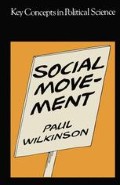Abstract
I have argued for the operational value of ‘social movement’ as a general type-concept in the study of social collectivities or groups. ‘Social movement’ was defined in chapter i as a deliberate collective endeavour to promote change, having at least a minimal degree of organization, and founded upon the normative commitment and active participation of followers or members. In chapters 3, 4 and 5, it has been proposed that a fairly comprehensive typology of social movement can be constructed, and that with the use of such a framework, it is profitable to examine some of the major concepts, theories and political implications of various major types of movement drawing on the extensive literature and using comparative analysis.
Preview
Unable to display preview. Download preview PDF.
Notes and References
See Charles Taylor, “Neutrality in Political Science”, in Philosophy, Politics and Society (Third Series), edited by Peter Laslett and W. G. Runciman, Basil Blackwell, Oxford 1967, pp. 25–57,
and Gunar Myrdal, Objectivity in Social Research, Duckworth, 1970.
W. H. Chaloner, “The Agitation Against the Corn Laws”, in Popular Movements c. 1830–1850, edited by J. T. Ward, Macmillan, London 1970, p. 146.
See Peter M. Blau, Exchange and Power in Social Life, Wiley, New York 1964,
and Frank Parkin, Middle Class Radicalism, Manchester University Press, 1968,
Werner Sombart, Socialism and the Social Movement, Dent, London 1909, P. 8.
James Jupp, Political Parties, Routledge and Kegan Paul, London 1968, p. 64.
R. Tucker, “The Deradiralization of Marxist Movements”, in American Political Science Review, Vol. LXI, No. 2, June 1967, pp. 343–58.
Kenneth Newton, The Sociology of British Communism, Allen Lane The Penguin Press, London 1969.
Alexis de Tocqueville, Democracy in America, World Classics Edition, Oxford University Press, London 1952, pp. 376–7.
See, for example, Emile Durkheim, The Division of Labour, The Free Press, Glencoe, 2nd edn 1947;
Otto von Gierke, Natural Law and the Theory of Society, 15oo–1800, 2 vols, Cambridge University Press, 1913;
F. W. Maitland, “Introduction” to Otto von Gierke’s Political Theories of the Middle Age, Vol. 3, Cambridge University Press, 1900;
J. Neville Figgis, Churches in the Modern State, Longmans, London 1913;
G. D. H. Cole, Guild Socialism Restated, Parsons, London 1920;
Harold J. Laski, A Grammar of Politics, Yale University Press, New Haven 1925;
and Bernard Crick, In Defence of Politics, Weidenfeld and Nicolson, London 1962.
See, for example, Karl Mannheim, Ideology and Utopia, Routledge and Kegan Paul, London 1936;
Erich Fromm, The Fear of Freedom, Routledge and Kegan Paul, London 1942;
Hannah Arendt, The Burden of our Time, Secker and Warburg, London 1951;
William Kornhauser, The Politics of Mass Society, Routledge and Kegan Paul, London 1960.
W. Kornhauser, “Mass Society and Mass Phenomena”, International Encyclopaedia of Social Sciences, Vol. 10, 1968, p. 60.
S. M. Lipset, M. Trow, J. Coleman, Union Democracy, The Free Press, Glencoe 1956, pp. 79–80.
On the Chartists, see Mark Hovell, The Chartist Movement, Manchester University Press, 1943;
Asa Briggs (ed.), Chartist Studies, Macmillan, London 1959;
A. R. Schoyen, The Chartist Challenge, Heinemann, London 1958.
Among the few full-length contributions in this area the reader is referred to: Abraham Holtzman, The Townsend Movement: A Study in Old Age Politics, Bookman Associates, New York 1963;
and Mary R. Dearing, Veterans in Politics: The Story of the GAR, Louisiana State University, Baton Rouge 1952.
Martin Luther King, Chaos or Community? Hodder and Stoughton, London 1968, p. 61.
Peter M. Blau, Exchange and Power in Social Life, Wiley, New York 1964, PP. 5–6.
H. H. Gerth and C. W. Mills (eds), Max Weber: Essays in Sociology, Routledge and Kegan Paul, London 1948, p. 120.
Frank Parkin, Middle Class Radicalism, Manchester University Press, 1968, P. 33.
See G. D. H. Cole, A Short History of the British Working Class Movement 1789–1947, Allen and Unwin, London, rev. edn 1948,
See S. M. Lipset, “Student Opposition in the us”, Government and Opposition, Vol. 1, No. 3, 1966, pp. 351 – 74.
See Abrams and A. Little, “The Young Voter in British Politics”, British Journal of Sociology, Vol. 16, No. 2, 1965, p. 95;
and F. Musgrove, Youth and the Social Order, Routledge and Kegan Paul, London 1964.
See A. Roberts (ed.), The Strategy of Civilian Defence, Faber and Faber, London 1967.
Author information
Authors and Affiliations
Copyright information
© 1971 Macmillan Publishers Limited
About this chapter
Cite this chapter
Wilkinson, P. (1971). Reform and Moral Crusade. In: Social Movement. Key Concepts in Political Science. Palgrave, London. https://doi.org/10.1007/978-1-349-01093-6_6
Download citation
DOI: https://doi.org/10.1007/978-1-349-01093-6_6
Publisher Name: Palgrave, London
Print ISBN: 978-0-333-12105-4
Online ISBN: 978-1-349-01093-6
eBook Packages: Palgrave Political & Intern. Studies CollectionPolitical Science and International Studies (R0)

